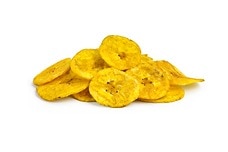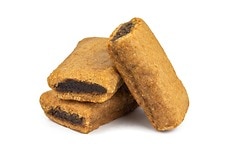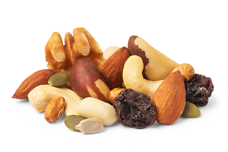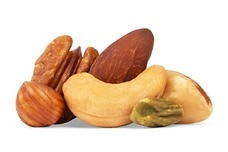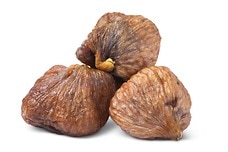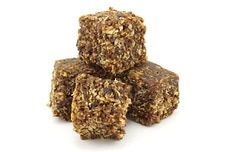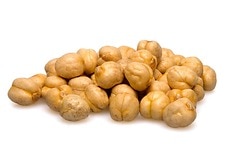6 Ways to Beat the Afternoon Slump
The dreaded afternoon slump: sometimes you feel it coming from a mile away, and other times it hits you without warning. As your energy plummets and your eyelids begin to droop, it is time to take stock of your current status and make some changes to restore your energy. Attending to your body’s nutritional needs is one of the best ways to pull yourself out of an afternoon slump.
We all know the feeling of the afternoon slump -- fatigue, low energy, difficulty concentrating -- but what causes this phenomenon? Part of the problem is simply our biology. We may be hardwired to take an afternoon nap, meaning that our circadian clocks are telling us to snooze for a few minutes (Kellow, 2014). However, the timing of your afternoon slump can also depend on the type of breakfast and lunch you eat. After a high-fat meal, your body slows down and enters that afternoon slump period (First, 2013). In contrast, eating higher carbohydrate foods can give you a sustained release of energy that helps you stay alert for the rest of your work day. Consider the following strategies to beat the afternoon slump.
1. Eat a nutritious breakfast.
Eating a nutritious breakfast starts your day off right. Unfortunately, many people feel like they are too busy to eat breakfast every morning. Skipping breakfast sets you up for failure, as you are more likely to eat a large lunch to compensate for the missed meal. This can cause you to become more tired in the afternoon (Kellow, 2014). The best breakfast is one that includes a whole grain product and some protein. For example, you could eat a bowl of steel cut oats with fresh berries. A yogurt cup topped with granola and a banana is another healthy choice that is easy to grab as you head out the door.
2. Stay hydrated.
Proper hydration is critical to maintain effective bodily functioning, and it can actually help to turn your afternoon around. When our bodies become dehydrated, we begin to feel less energetic and may have more difficulty focusing (Kellow, 2014). To ensure you get enough water during the day, begin drinking water as soon as you wake up. The recommended intake is about 13 cups per day for men and 9 cups for women (Mayo Clinic, 2014). Carrying a reusable water bottle with you will help you have access to proper hydration throughout the day. If you get sick of drinking plain water, try to avoid sugary or caffeinated beverages. Instead, add a slice of lemon, a sprig of mint, or some berries to your water for an extra -- and natural -- flavor boost.
3. Avoid the caffeine temptation or use in moderation.
If you’re tempted to grab a double espresso to pull yourself out of a mid-afternoon slump, stop! Drinking caffeine after 1:00 or 2:00 in the afternoon can actually cause you to have difficulty getting to sleep at night (First, 2013). A very small amount may give you the mental boost you need without dysregulating your sleep. If you must have caffeine, enjoy a mug of hot tea or a small piece of chocolate to reap the benefits of a mild stimulant without the sleep problems that come with something stronger (Readers Digest, n.d.).
4. Grab a healthy mid-afternoon snack.
When feeling tired in the mid-afternoon, your instinct may be to grab a bite to eat. It turns out that this instinct is correct, but we often make the wrong choices when selecting snack foods. Chips, candy bars, graham crackers, and even certain brands of granola bars often contain high amounts of simple carbohydrates (Harvard Medical School, 2015). These foods cause your blood sugar to rise sharply and then fall, leading to a drop in energy.
Instead, make sure your afternoon snack contains plenty of protein and some complex carbohydrates. The complex carbohydrates will help you have a sustained release of energy. Meanwhile, lean protein tends to prevent your brain from producing sleep-promoting serotonin while boosting levels of norepinephrine and dopamine, which tend to improve alertness (Kellow, 2014). For example, you may want to eat whole-wheat crackers topped with slices of cheese, a hard-boiled egg with a piece of fruit, trail mix with dried fruit, or raw vegetables with hummus.
5. Take a walk.
Exercising naturally boosts blood flow to your brain and throughout your body, which can prevent you from feeling tired (ACE Fitness, n.d.). Bumping up your heart rate also boosts levels of brain chemicals associated with alertness (Kellow, 2014). One good option is to head to the gym during your lunch break, which gives you an energy boost to counteract an afternoon slump. If you don’t have time to make it to the gym, take a 10-minute break to walk around. Walking outside can help you mentally refresh and will leave you feeling more alert once you return to your desk.
6. Get a B vitamin boost.
B vitamin complex has been shown to regulate circadian rhythms and prevent daytime sleepiness (Mayer, Kroger, & Meier-Ewert, 1999). Leafy green vegetables, such as spinach, parsley, mustard greens, and turnip greens are great sources of B vitamins (WHFoods, 2015). Additionally, eating beets, broccoli, tofu, and fish can help you get enough of these essential nutrients. Eating a lunch salad of dark leafy greens topped with salmon or sardines is a great way to get a B vitamin boost to prevent the afternoon slump.
Healthy Recipes to Stay Alert
The following recipes offer lunches and snacks that will help stave off your mid-afternoon slump. Try these delicious dishes today! You can find more healthy ideas for recipes on our healthy lunch recipes page, and be sure to check out the readily edible snacks we sell below.
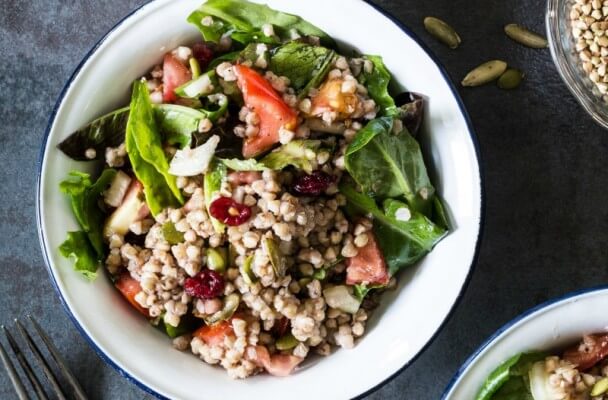
Buckwheat Salad Recipe
This buckwheat salad serves up a supple serving of sustenance to stave off your slump through a provision of palatable complex carbohydrates in buckwheat and myriad vitamins and minerals from fruits, veggies, and seeds!
Ingredients: Mixed greens, buckwheat, tomatoes, onion, raw pumpkin seeds, dried cranberries, rice wine vinegar, sesame oil, salt, black pepper.
Total Time: 15 minutes
| Yield: 5 servings
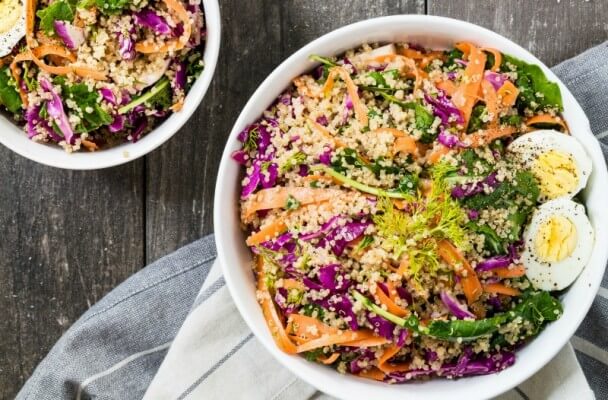
Kale Quinoa Salad Recipe
Another superb salad saturated with super foods from which to subsume all manner of starches, this kale and quinoa combination can keep creative cogitation coming and encourage determined diligence through dinnertime.
Ingredients: Quinoa, fresh baby kale, purple cabbage, carrots, fresh dill, boiled eggs, rice wine, extra virgin olive oil, black pepper.
Total Time: 25 minutes
| Yield: 8 servings
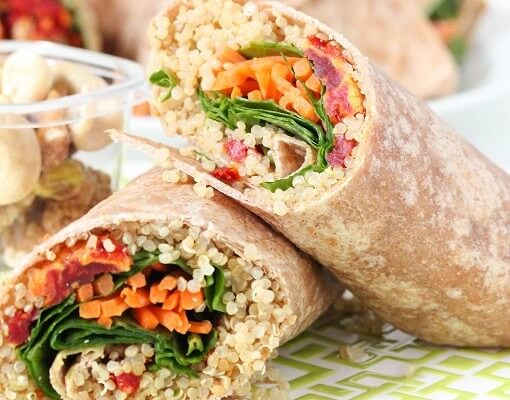
Quinoa Veggie Wrap Recipe {vegan}
This recipe can double as either a delectable dish to damper the dour mood of the late afternoon, or a savory snack to stave off the hunger pangs that strike at that critical hour. Embrace the complex starches of whole wheat and quinoa and make these wraps today!
Ingredients: Tortilla wraps, quinoa, hummus, fresh spinach, sun-tomatoes, shredded carrots.
Total Time: 30 minutes
| Yield: 4 wraps
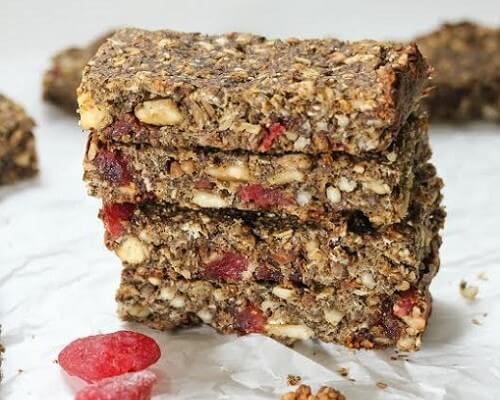
Homemade Granola Bars Recipe {gluten-free}
For when the standard time for the insidious slump rolls around, stop it in its tracks with this wholesome, homemade granola bar. The treat is packed with fruits, seeds and nuts that supply the macronutrients you need with unsaturated fats to fuel your endeavors.
Ingredients: Dried mulberries, dried strawberries, raw cashews, organic peanut butter, ripe bananas, raw sunflower seeds, hemp protein powder, gluten-free rolled oats, chia seeds, flaxseed meal.
Total Time: 40 minutes
| Yield: 12 bars
Healthy Snacks to Circumvent the Slump
Small snacks can supply just the sustenance you need to stay spry. Sample some from the selection below to find your new go to treat to eat when the afternoon slump approaches.
Healthy Eating
- Healthy Snacks
- Healthy Meals
- Healthy Recipes
- Sports Nutrition
- Nutrition and Special Diets
- 21 Day Fix
- 5 Popular Diet Similarities
- Alkaline Diet
- Anti-Inflammatory Diet
- Calorie Counting
- Carb Cycling Diet
- Celiac Disease
- Cholesterol
- Clean Eating
- Crohn's Disease
- DASH Diet
- Detox Diet
- Diabetes
- Diabetes Diet
- Diet Pill Dangers
- Fat Burning Foods
- Gluten-free Diet
- Glycemic Index
- Heart Health
- High Blood Pressure Diet
- High Fiber Foods
- How to Eat Healthy
- How to Lower Blood Pressure
- Hypertension
- IBS Diet
- Ketogenic Diet
- Liquid Diet
- Low GI Foods
- Low-Carb Diet and Foods
- Low-Fat High-Carb Diet
- Mediterranean Diet
- Mediterranean Diet Foods
- Military Diet
- Nutrition Labels Explained
- Paleo Diet
- Raw Food Diet
- Superfoods
- Sustainable Weight Loss
- Thrive Diet
- Vegan Diet
- Vegetarian Diet
- Weight Loss Shakes
- Whole30
- Vitamins, Minerals & Nutrients


